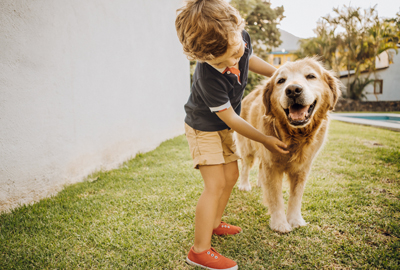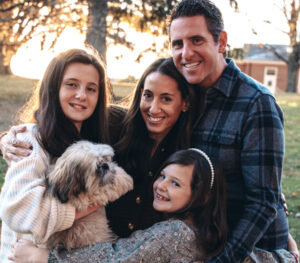By Donna Kane, MA, CT, Grief Clinician, Jewish Community Services
How to Talk to Your Child
After Losing a Pet

I never thought silence could be so loud. There were no shrieks of glee when I came home. No whining and drama when I would leave the house. No barking, no smooshing up against me when I was reading. No snoring when I was studying, no yips, puppy barks, no low growls to warn off the UPS man, the FedEx woman, the neighbors. The quiet was deafening. It was a constant reminder of the absence of my friend, my guardian, my comedian, my dog, Mowgli.
Some people may find it difficult to understand the relationship you shared with your pet. It is a special and unique bond that many may minimize, even if unintentionally. You’re told things like, “it’s just a cat” or “you’ll get another dog.” But it’s not that simple. Mowgli wasn’t just a pet and it would take me years before I was ready for another.
When a pet dies, the loss, like other losses in life, can cause intense grief and sorrow. The relationship needs to be mourned. And, like other losses, there is no timeline for your grief. Everyone is on a different journey.
For a child, a pet’s death is often the first time they are experiencing loss and grief. Here’s how you can help them through the difficult time:
- Prepare your child for a pet’s death if possible.
- Reassure your child that nothing they did or did not do caused their pet’s death. Pulling a whisker or forgetting to feed a pet can cause great concern for a child when their pet is sick or has died. My six-year-old was very concerned that our 110-pound dog died because he would pull my son on a sled. Listen to your children! The concern he expressed would never have occurred to me.
- Be open and honest and try to remain calm. Your child is looking to you for a reaction to the event.
- Answer questions in a direct, simple, age-appropriate way. For example, Titan died because his body stopped working. This will help your child accept their loss and move forward.
- Use story books to help your child understand the event and their feelings.
- Help your child honor and memorialize their pet. Older children may want to volunteer at a shelter. Younger children may want to draw a picture book or write a story.
- Remember that each child will process loss differently. Do not expect your children to react in the same way.
You also may find yourself wondering or questioning your beliefs in an after-life when a pet dies. Many people, some whose opinions will be important to you, will offer their opinions. It is important that you find the answers that are right for you.
Where and how do you begin to work through the loss of a pet?
- Acknowledge and accept your loss. This will happen over time and may take weeks, months, or years. Be kind to yourself.
- Allow yourself moments of outward expression. Freeing and sharing your feelings will be healthier than pushing them aside and ignoring them. It took me a while before I could share with people that my dog died. Once I was able to talk about my loss it helped me to feel a bit lighter.
- Do not cut yourself short; give yourself time to grieve. I still feel a pain in my heart when I see someone with a dog that looks like Mowgli, but as I’ve traveled further on this journey of reconciling the loss, I no longer lose myself in that moment. It stops me for a second, then I go on.
- Search for meaning. My dog died when he was 5 years old. He should have lived until 10 or so. Asking why your beloved pet had to die and understanding the meaning and importance of your relationship are painful things to reflect on. Remember that it is the asking, not the knowing, that is an important step in your grief work.
- Adjust to your new identity and your new normal. You were a pet owner, but you are no longer the guy with the black and white cat in the window or the lady with the beautiful German Shepherd. People may ask why your dog isn’t with you or say they haven’t seen your cat in the window. Adjusting to this change is a part of the mourning. A friend of mine once told me when she is having a hard time managing her anxiety she goes for a walk and imagines her dog beside her. She knows her dog has died but she is comforted by the memories of their walks together.
- Embrace your memories, whether they are happy or sad. Talk about your pet. I have a list of Mowgli-isms on my desktop. My family’s favorite Mowgli story is still told whenever anyone in my extended family gets a puppy. Memories help to keep your pet “alive” and serve to preserve your relationship.
- Most importantly, accept the love and support that your friends, family, and fellow pet lovers will provide.
There is a saying, “Death ends a life, not a relationship.” No one gets “over” grief. It is a life-long journey that changes over time. Talking with others who have had the same experience may help you feel less alone and better understood. Jewish Community Services offers many grief groups to give those in need a safe place to find solace and support. Learn more at jcsbalt.org/grief.
Subscribe to our newsletter
The Associated is a home for everyone in the Baltimore Jewish community. We offer several email lists to help people find a community, engage with their peers and support Jewish journeys around the world.
Join Our Mailing ListAdd Impact to Your Inbox
Sign up for our newsletter
Subscribe to our newsletter
The Associated is a home for everyone in the Baltimore Jewish community. We offer several email lists to help people find a community, engage with their peers and support Jewish journeys around the world.
Join Our Mailing List






 Please Wait while we loading your video.
Please Wait while we loading your video.